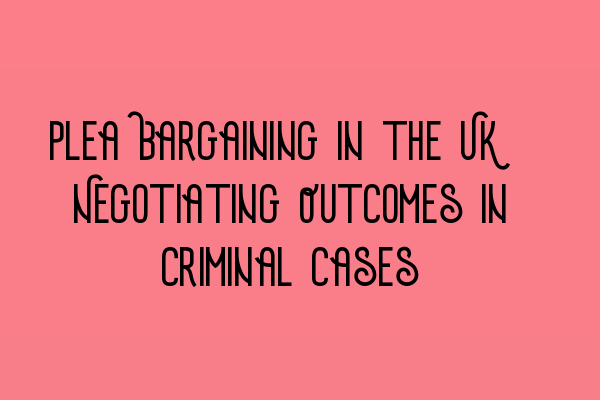Plea Bargaining in the UK: Negotiating Outcomes in Criminal Cases
Welcome to the SQE Criminal Law & Practice Law UK blog! In today’s post, we will discuss plea bargaining in the UK and the importance of negotiating outcomes in criminal cases. Plea bargaining is a complex yet essential aspect of the criminal justice system, allowing defendants to negotiate with the prosecution in order to achieve certain outcomes in their cases.
Understanding Plea Bargaining
Plea bargaining involves the defendant and their legal representative working together to reach an agreement with the prosecution, often resulting in reduced charges or lesser sentences. By participating in plea bargaining, defendants can potentially avoid lengthy trials and the uncertainty that comes with them.
When engaging in plea bargaining, it is crucial to have a skilled solicitor who is well-versed in criminal law. At SQE Criminal Law & Practice Law UK, we offer comprehensive SQE 1 and SQE 2 preparation courses to ensure that solicitors are equipped with the knowledge and skills required to navigate the intricacies of plea bargaining successfully.
Benefits of Plea Bargaining
One of the key advantages of plea bargaining is that it can result in a more favorable outcome for the defendant. By negotiating with the prosecution, defendants may be able to secure reduced charges or a lesser sentence. This can significantly impact their future, avoiding the potential consequences of a harsher conviction.
Additionally, plea bargaining helps alleviate the burden on the criminal justice system. By resolving cases through negotiation, courts can save time and resources that would otherwise be expended on lengthy trials. This allows for a more efficient judicial process.
Preparing for Plea Bargaining
Preparation is key when it comes to plea bargaining. Solicitors must thoroughly evaluate the strengths and weaknesses of the case, gathering evidence and ensuring the defendant’s rights are protected. Our SQE 1 Practice Exam Questions and SQE 1 Practice Mocks FLK1 FLK2 resources are valuable tools designed to help solicitors prepare for the challenges of negotiating outcomes in criminal cases.
Moreover, staying up-to-date with current SRA SQE exam dates is crucial for solicitors who wish to pursue a successful career in criminal law. By being aware of upcoming exam dates, solicitors can plan their preparation courses effectively. For more information regarding SQE 1 and SQE 2 preparation courses, please visit our SQE 1 Preparation Courses and SQE 2 Preparation Courses pages.
The Role of a Skilled Solicitor
A skilled solicitor plays a crucial role in plea bargaining. They possess the expertise to assess the strength of the prosecution’s case, identify potential defenses, and negotiate with the prosecution to achieve the best possible outcome for their clients. Our team at SQE Criminal Law & Practice Law UK is dedicated to providing solicitors with the necessary knowledge and skills to excel in plea bargaining and other criminal law matters.
In conclusion, plea bargaining is an essential tool in the UK criminal justice system. It allows defendants to negotiate outcomes and potentially achieve more favorable results in their cases. At SQE Criminal Law & Practice Law UK, we understand the significance of plea bargaining and offer comprehensive preparation courses, such as our SQE 1 Practice Exam Questions and SQE 1 Practice Mocks FLK1 FLK2 resources, to empower solicitors in their pursuit of successful outcomes in criminal cases.
For more information about SQE 1 and SQE 2 preparation courses and to stay updated on SRA SQE exam dates, please visit our website: SRA SQE Exam Dates. We are here to support and guide you every step of the way.
